#epileptic mothers
Explore tagged Tumblr posts
Text
Breastfeeding is a profoundly rewarding experience for mothers, fostering a strong bond with their infants and providing essential nutrients for optimal growth and development. However, for mothers managing epilepsy, breastfeeding may raise concerns and questions about safety and medication compatibility. In this article, we’ll explore important information and considerations for epileptic mothers who are breastfeeding, with insights from Dr. Rohit Gupta, Chairman of the Neuroscience Department at Accord Superspeciality Hospital.
#best neurologist in faridabad#faridabad neurologist#epilepsy specialist in faridabad#epilepsy awareness#epilepsy specialists in faridabad#epileptic mothers
0 notes
Text
death to all landlords ong
#and this goes out to the one that not only lied about putting in my work order to the ac company#letting me sit in 90+ degrees thinking someone was on the way to fix it when like… my mom is epileptic and heat does induce her seizures#and I pay these mother fuckers $1450.00 a MONTH#and when they finally put the work order in they didn’t even give them the right address…#so now it’s another day in Florida heat trying to keep myself my dog my two ferrets and my disabled mom from overheating#when I pay#nearly 20k a year to these losers
19 notes
·
View notes
Text
My mom: sure you’re shy but you don’t have that much anxiety, you don’t need medication
Me: *has actual panic attacks*
Mom: Ok maybe you need medication but it isn’t extreme anxiety
Me: *literally develops psychogenic seizures, has both depression and PTSD, and obsessive thoughts common in OCD*
Mom: yeah but you’re not mentally ill cause it’s not like you’re crazy
#funny#funny post#funny stuff#haha funny#sad but true#mother#my mom <3#my mom#depresso#tw depressing thoughts#depressing life#sorry for being depressing#actually epileptic#actually mentally ill#anxiety#psychogenic non epileptic seizures#ptsd recovery#ptsd
9 notes
·
View notes
Text
5/18/24
I am feeling such a sense of FOMO right now, the alien parade is happening and I’ve had to cancel all my plans to see my friends this weekend because people are feeling sick and I cannot jeopardize my mom’s surgery by being careless. I know I’ve made the right choice by canceling our zoo birthday celebration for my friends daughter and the meet up to see my childhood best friend and her family, but it just kind of hurts still, if you can imagine.. I’ve been pushing myself to see more people and for some reason it feels like almost every time it has had to be canceled I’m not giving up but feeling depleted for sure and super disappointed that things didn’t work out this time.. and now I’m seeing everyone outside headed to the parade, I used to go every year and it was such a blast, now going to a parade surrounded by flashing lights, loud noises and tons of people and bodies, it’s a totally different thing for my brain and I’m still learning how to maneuver a situation like that without getting triggered.
Along with that I’m feeling massively drained, both mentally and physically exhausted.
I know it will get better again but I’m just so sick of missing out on events in life because of my seizures, and I’m praying to the universe that my mom stays healthy so she can get through this major surgery and have things go as smooth as possible.
I hope you are all doing well and that your day brings a smile to your face. Count your blessings please!
Don’t take walking somewhere or driving or being able to go to work for granted because some of us can’t do those things right now and let me tell you it’s dreadful.
Keeping my head up though..
#good thoughts#my thoughts#healing#honeycombhank#life with seizures#life with non epileptic seizures#mental health#positive thinking#trying my best#sad news#canceling plans#old friends#best friends#sick#mother
2 notes
·
View notes
Text
What do you mean that a semi obscure Japanese movie from 1951 based on a novel by Fyodor Dostoevsky doesn't have any fanfics on AO3????
#watching the Japanese version of The Idiot and like the tension between Kameda and Akama is insane#worlds worst polycule: kameda akama and taeko#kameda & taekyo: me and the bad bitch I pulled by telling her that her eyes remind me of a man sentenced to death#akama & taeko: hey i know if i marry you that you'll murder me out of this weird passion desire hatred love thing you've got going on#and I'm willing to do it.#kameda & akama: I'm going to force you to trade charms with me and then meet my mother thus cementing our relationship#and then later I'll try to kill you but get scared by your epileptic fit and youll refuse to entertain the idea that i could ever kill you.#do you see my vision#the secret of life lies in horrible polycules. all media is made better by them#the idiot 1951
7 notes
·
View notes
Text
I know no one cares but I could really use help to save up money this man I live with her dad won’t know about so I can save up for a deposit and a moving truck so I can get out! Let’s just say I don’t feel he watches our three year old and I fear for my saftey at times if theirs a way in here to tip you can I do have a PayPal he doesn’t know about. So if you can help me please it would mean a chance at a normal life for us both!
#mental health#epileptic mom#mom help#help for moving#help for mothers#help me move#helpmeachievemydream#help me with this#I need help and money#i need money#to escape#life#safer life#help me please 🙏#helpmeandmydaughter
4 notes
·
View notes
Text
One of these days I'm going to actually revisit my idea for an essay analyzing Zenos
Maybe once I actually have access to like. Medicine.
#I have tasted being able to function like a normal human being semi-regularly and then had it stolen from me by falling off insurance#and I have never returned to those lofty heights of#''can reliably one or twice a week Get Shit Done''#caffeine helps a bit but I'm epileptic so taking enough to actually impact my brain positively is taking enough to impact it negatively#it's a raw numbers problem#I can't produce reliably enough to build a patron base#so I can't afford meds#which means I can't produce art reliably...#which means... you get the idea#and it's not like there are any jobs within walking distance rn#and I can't drive bc (as before) I need meds#and given my mother's ongoing health issues and my dad being diagnosed with diabetes recently#something that isn't life threatening just isn't a priority
2 notes
·
View notes
Text
St4 premiere day was wild because i woke up to news billy appeared so obviously had to rush to watch that but i was interrupted when my mother had a seizure so… mixed bag emotions that morning lmfao
#no need to worry about my mother she is epileptic these things happen#I can joke about this because well it’s my mom not yours so#also she’s fine lmfao
1 note
·
View note
Text
My toxic trait is coming out of nowhere after long periods of silence when someone mentions something I’m interested in or have experience with and going, “Oh, did you know/ Fun fact —“ and when I’m done I feel the need to say something funny before slinking back in my dark hole in shame to be silent for another un described unit of time, telling myself I will not interrupt or speak at all if I hear someone mentioning something I’m interested in or have knowledge about I will not speak I will not respond I will stay normal and silent I will —
#and then I die#I used to be even worse about it too as a kid#but my mother tended to reprimand me for lack of a better word#so now I just stand in the corner holding my drink and doing my best to not talk#’they don’t even know why [anything here actually]’#the devil on my shoulder is always going ‘you want to join in this conversation with your own fun facts and anecdotes sooo bad you wanna!’#the angel is like ‘if you do you will be publicly humiliated and laughed at behind your back moodkiller’#and I’m in the middle with tears down my face wanting so badly to join a conversation or in on a joke but knowing I can’t lest I attract#unwanted attention and knowing I’ll only feel extreme guilt and shame afterwards#posting to side#quivering crying shaking#I’m stuck in the loop!#it’s better online bc at least I can delete my message where I explain at length the difference between non epileptic seizures and#epileptic seizures (there is a difference!)
0 notes
Note
Oof I felt that.
Randy is the type of guy to not go to the ER because he doesn't want to be a bother (he is very well on the verge of dying).
Also the 'Fuckface' accident.
.
#LySr reblog#Also dang this just reminded me of that one time I had an epileptic episode#And when I woke up I literally begged my mother not to take me to the hospital.#I still went there tho.. Heh.
23 notes
·
View notes
Text
another thing that's weird about adults who make an identity out of reading children's books is what they hold up as representative of the values they find in YA/young reader's fiction. They typically bring up wish fulfillment fantasy, morals and clear cut lessons, adventure stories with mild peril, strong centering on friendship and found family, and stories that make them "feel good" and are extremely light on genuinely challenging themes or ethically dubious situations.
Meanwhile when I was neck-deep in YA as a kid in the 90s and early 2000s this was the kind of stuff I was reading, other kids were reading, and that was winning awards, being highlighted on shelves and recommended by librarians:
Hatchet by Gary Paulsen, in which a teenage boy survives a plane crash and is stranded in the Canadian wilderness and forced to survive on his own for months. He is ultimately rescued but is permanently altered by the experience. His navigating the drama of (I believe either currently separating or recently divorced) parents is also a major plot element.
Virtual War by Gloria Skurzynski, where real-life wars have been eradicated and instead are fought virtually, (inspired, if I remember correctly, by the disastrous results of a previous nuclear conflict) by specially chosen champions who are trained in combat strategy from childhood. Throughout, the three child champions are forced to question and push back against what the government has told them is the truth as well as against their own prejudices, including toward one of their own who is considered a "mutant" due to his dwarfism; it also details the grueling hours-long "war" in which the kids watch thousands of little 3D soldiers get blown up and dismembered and leaves them feeling genuine guilt for participating in.
Julie of the Wolves by Jean Craighead George, which focuses on a teenage Inuit girl who is orphaned, forced into marriage and sexually assaulted, then runs away and ends up lost in the Arctic and survives by befriending and living with a pack of wolves.
Out of the Dust by Karen Hesse, in which the heroine lives with her parents on a failing farm as the Dust Bowl is beginning, accidentally sets her pregnant mother on fire resulting in her mother's lingering death and the death of her baby, and the girl herself being permanently maimed, after which she and her father become estranged and she eventually tries to run away.
Summer of My German Soldier by Bette Greene, which follows a young Jewish American girl on the WWII homefront who befriends (and falls in love with) a German POW, and when he escapes, hides him in her home for months; eventually the prisoner is caught and killed and the girl is sent to prison after being ostracized from the community and disowned by her parents.
The Ramsey Scallop by Francis Temple, where the heroine, engaged since childhood to her current fiance, is sent on a pilgrimage with him as way of working out his trauma from serving in the crusades. Neither of them feels ready to get married and the fiance is dubious about doing much living at all, but they're able to get to know each other and build trust on the road. It's been ages since I read it but I'm pretty sure there's a scene where a hot single guy who helps patch up an injury she sustained then offers to have sex with her, which she decides to turn down.
Music of the Dolphins by Karen Hesse, where a feral child who has been raised by a pod of dolphins is rescued and taken to a center for rehabilitation. The whole thing follows her progress at understanding to how to be human, and eventually her decision to reject it all and go back to her dolphin family.
The Last Book In the Universe by Rodman Philbrick, whose hero is a teenage orphan living in a purposely abandoned dystopia, ostracized by his community for being epileptic, whose only friends are an old man who is the last literate person in the community and a monosyllabic feral child. The split between the have-nots and the haves, who live in sheltered futuristic cities, and discussion of privilege (one of the main characters is a girl from the cities who comes out to do charity work in the dystopian district) are major themes, and violence is a regular occurrence, including toward the finale when the boy's mentor is murdered by a mob while he watches.
(And of course there's Among the Hidden and its sequels by Margaret Peterson Haddix which I never read, but my sister did, and I know at some point a whole bunch of child characters are massacred by the government because it upset my sister so badly she cried.)
And I couldn't forget The Dear America series, which includes:
character who is finishing high school as the Vietnam War begins and watches her social circle split nastily over the issue, lives through classmates and friends getting drafted, and ends up working at a hospital as volunteer where she is assigned to help disabled veterans
character whose mother (and I think siblings), as well as numerous fellow travelers die while traveling alongside her on the Oregon Trail, and later accidentally poisons to death several of her friends after picking a look-alike plant for their dinner; only one survives, who she eventually marries
character who is kidnapped by a local native tribe and eventually adopted, then marries a fellow captive, only for him and other friends and family to be killed when the tribe is attacked by Europeans, putting her into a total crisis of identity and conflicting loyalties
character who is taken from her tribe to be put in residential school, during which she is forcefully acculturated, severely bullied by another classmate, and a childhood friend of hers is accidentally buried alive
multiple books about immigrants in the 1800 and 1900s which highlighted struggles with poverty, cultural pressures, and prejudice; one of them follows a pro-union factory worker who watches as multiple friends die in the Triangle Shirtwaist fire, and another whose father imports her to America at 13 to marry a coal miner
most of these stories emphasize the young protagonist ending up in situations were they are either on their own, or so alienated from the adults around them that they might as well be. The protagonists have to assume the adult duty of taking care of themselves, but also of thinking for themselves and making their own decisions and judgements about their lives and the world.
they are also going through big changes, often ones created by their parent's decisions, and which they frequently dislike or are straight up Bad for them. This contrasts with later, when the protagonists are able to make decisions for themselves-- often this comes through hardship and abandonment, but ultimately allows them to control their narrative going forward.
the setting and events are often harrowing, deeply unpleasant, and put the protagonist and their friends in danger of victimization by forces around them. Obviously this is exciting for kids to read, but it also allows them to see someone their age on their own, entering into Adult situations and taking on that role. It's also a break from the overtly positive or cartoonishly (but usually un-seriously) bad circumstances that dominate younger kids fiction and an introduction to the idea that life is just terrible most of the time, sometimes massively and unbelievably so. (It's going from the early childhood story of Madeline's thrilling adventures escaping forced labor in a factory, to the older kid's or YA story of seeing the protagonist work at one day after day, getting injured, having friends get sick, and then watching a girl's scalp get ripped off by the machine, something which creates not excitement but genuine horror and sympathy.) These plots also allow adolescents a chance to experience Big Emotions (like the ones they're about to fall head-first into themselves) in a stable, safe way. All of this aims to create a bridge from the juvenile reality to the genuine, adult one. Trite moral lessons are dispensed with in favor of allowing the child to go out and start thinking for themselves. And especially in stories like the Dear America books, it allows a look at things that happened in the past that we have, or should learn from, but also allows for a fuller emotional, ethical, and empathetic development.
often the introduction of sex is part of the story, from initial experiences of attraction (and the resulting self-consciousness, jealousy, etc.) but also sometimes actual sexual experience. Especially in the historical stories, marriage is also frequently part of the story-- either again, as a fantasy introduction to adult experiences, or as a realistic detail separating a child's historical experience from current ones and creating a better understanding of the hardships historical people went through.
and most include some form of rejection of prevailing authority and thought. Instead of blindly "doing what your parents tell you to" these protagonists must do what they think is practical or ethical. The boy in Hatchet cannot wait for an authority figure to guide him, he must figure out how to survive entirely on his own, while the kids in Virtual War are old enough to begin questioning the entire structure they've been raised in, and to develop empathy for figures that structure has deemed outsiders; the heroine of Music of the Dolphins decides the entire experience of being in human society is not for her, and returns to living with animals.
So these books offer harrowing circumstances, protagonists who are isolated literally or through moral or political alignment, and who must learn to live on their own and make decisions for themselves, often in defiance of prevailing attitudes. They usually emphasize finding one's place (even if that place is completely alone and unsupported), fostering understanding and sympathy with others, even with people who are considered "undesirable," who are different, or who have behaved badly to you in the past. And they frequently involve violence, budding sexuality, exploitation and abuse by authority figures/structures, and a heaping helping of death, including the deaths of beloved friends and family members. What is "feel good" and "unchallenging" about that? And like, I can't speak for what YA is bringing to the table now, but these people are overwhelmingly adults, they were reading YA at around the same time I was, I don't think it would be possible for them to have somehow missed the plethora of books with these hallmarks. So where did they get this idea that YA is some land of comfort where no complicated idea can ever reach you? Even Harry Potter is full of them, and we know they read that!
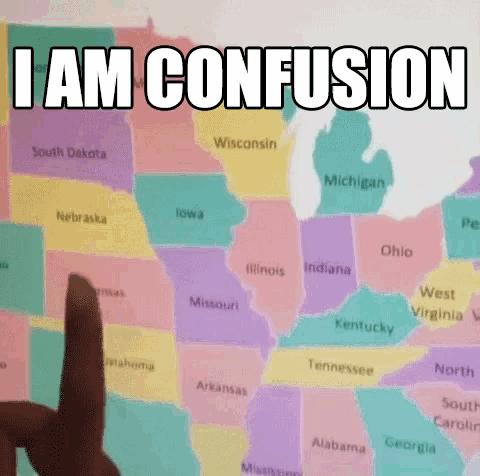
160 notes
·
View notes
Text
i don't think people appreciate how good the mice & murder "oops all college humor goofballs" season was. i rewatched it right at the beginning of burrow's end (for adorable woodland creature reasons) and it's just so underrated.
first of all, every member of the cast is KILLING IT. grant is genuinely witty as a sherlock holmes-style dandy and is solving the case in real time. rekha's southern drawl gives me life. katie goes full peaky blinders. raph is a master of rolling badly and then roleplaying exactly how his character fucked it up. and sam's portrayal of buckster $ boyd is so charismatic it makes me want him back in the dome for a side quest ASAP
ally's portrayal of lars gets its own bullet point because i genuinely believe it's some of their best work. often ally's characters are the lynchpin of season lore, but lars proves how much ally shines when their talents for comedy are harnessed toward nothing but inhabiting an impossibly loyal silly little thembo who knows a lot about astrology
*hits the trunk of my car* this baby can hold so many nat 20s in it
specifically the nat 20 that rekha hit which made brennan speed rewrite the entire season??? and it works so well i can't imagine any solution to this mystery other than the one he came up with???
lucretia brockhollow's voice
honestly i thought i would dislike the covid-season-ness of it all but i actually loved that you could see everyone's facial expressions at the same time. it's a lot more smoothly executed in a technical sense than unsleeping city: chapter 2 or even fantasy high: sophomore year
the gags carlos luna did with the figures in roll20??? come on
sometimes a family CAN be a mother who's an epileptic mole, a father that's a capitalistic javelina pig, and a grave-robber weasel son who's probably older than the dad
it's just so cozy and fun and laugh-out-loud funny it makes me feel like i'm wrapped up in a blanket sipping hot chocolate from a warm mug
#mice and murder#dimension 20#d20#burrow's end#sam reich#brennan lee mulligan#grant o'brien#rekha shankar#ally beardsley#katie marovitch#raphael chestang#carlos luna
466 notes
·
View notes
Text
I see many able-bodied people and non-photosensitive people confused as to why the Epilepsy Community on Tumblr refer to the Spider-verse Franchise as being inherently ableist. I can understand that if you are not familiar with the term, you may find this disconcerting. The film is not actively saying that disabled people are bad, nor do I think that they are making an active decision to harm disabled people. I do not think that they are making a film with the deliberate purpose of killing disabled people!
However, the active choices they make (e.g. not adhering to the rule that states that a flash rate of 3 - 30 per second is dangerous, and to avoid high contrasting patterns) are those which mean that Photosensitive People are barred from seeing the movie. This is a form of social discrimination. No, please, hear me out!
Scope, a leading charity for disabled people defines ableism as:
"A word for unfairly favouring non-disabled people. Ableism means prioritising the needs of non-disabled people. In an ableist society, it's assumed that the “normal” way to live is as a non-disabled person. It is ableist to believe that non-disabled people are more valuable to society than disabled people."
This is what the creators do. They unfairly assume that disabled people will have no interest in watching their film. They unfairly assume that the public will all pass on through word of mouth that the film is dangerous to watch for photosensitive people. It unfairly assumes that, because the majority of its audience will be safe watching it, those who are not safe do not matter as viewers or as people. It unfairly assumes that there Afro-latine People, Black People, Latine People, Jewish People, Women – the minorities the film chooses to represent – are all able-bodied and that if there do happen to be any people within those demographics that are also photosensitive, then they have no interest to see other parts of themselves represented on the screen in the same way.
Disabled people already feel incredibly isolated by society. People, especially children, with epilepsy are often barred from social events. They cannot attend nightclubs, concerts, sleepovers, school trips, long haul holidays and so on. On bright sunny days, my incredibly Photosensitive Mother cannot even drive the car because the flashes of sunlight between the leaves of trees will give her a migraine that will take days to recover from.
Therefore, when a company knows full well that their film is going to be talked about amongst the general public, that it is going to be a moment of cultural importance, to make a series of creative choices that knowingly bar disabled people from having this experience is a form of ableism.
Ableism is not always obvious. In fact, it usually is not. Why? Because ableism is focused on leaving disabled people at home. It is focused on pushing us to the side, and making sure we are never heard from again. And in this case, it does take this to the extreme. Exposure to this film can indeed cause a Photosensitive person to die. This is not an exaggeration.
3000 people a year die in the USA from epileptic seizures.
And as I have said before, this is not a case of us asking to be allowed to sit at the table. We are not asking for them to introduce an epileptic spider person! We are simply asking to not be shot at if we try to enter the room, and asking that you please listen to us when we explain that pointing a loaded gun at a disabled person who tries to interact with you, is, in actual fact, quite an ableist thing to do.
#actually epileptic#actually disabled#spider-man#into the spiderverse#across the spiderverse#spiderverse#itsv#atsv#marvel
853 notes
·
View notes
Text
Surprise Visits

Pairing: Eddie Diaz x reader
Word count: 2400
Warnings: seizure, epileptic reader, possible inaccuracies
Summary: Eddie shows up unexpectedly. Reader is glad he did for more than one reason.
A/N: This is only my second time writing for Eddie and last time it was a co-write. I did a whole bunch of research and had some proof reading from the lovely @thatonewriter15 and @muchamusedaboutnothing. Hopefully this is a somewhat accurate representation... 🤞🏻
Trudging up the stairs towards her apartment, she cursed the elevators for being broken. All she wanted to do was collapse into her bed and sleep for two days. Unfortunately, that was impossible since it was only Wednesday and she had an important meeting first thing in the morning.
Passing the third floor, she considered if she was going to eat before she went to bed. She was starving, but cooking seemed like too much effort and time. Then she considered having something delivered but guessed that would take even longer than cooking. She decided to just eat a spoonful of peanut butter so that she wasn’t battling hunger while trying to fall asleep.
Finally reaching the fifth floor, she exited the stairwell and took the four steps to her door. It was a small victory for climbing the stairs— at least she didn’t have further to go once she got to her floor.
She unlocked the door and pushed it open. Immediately, she dumped her purse, jacket, and laptop case on the floor beside the door before pulling her shoes off one at a time to drop in the pile.
Rounding the corner into the living room, she gasped. Her favorite scented candle was lit on the coffee table next to several containers of Chinese take-out. Eddie stood from the couch as she approached.
“What are you doing here?” she asked as she let herself fall into his embrace.
He pecked a kiss to her temple as he pulled back to look at her. “You sounded a little overwhelmed when you called earlier. So I had Buck take Christopher for the night, and I brought you dinner.”
Tears welled in her eyes as she was overcome with emotions. “I love you. You are the best. I was about to eat some peanut butter because I’m too exhausted to cook or wait for delivery.”
“And let me guess, you’ve barely eaten anything all day?” he chastised.
She shrugged. “I had a bagel for breakfast.”
He pulled her over to sit on the couch. “I’m glad I came then.”
“I’m really glad you did.” She grabbed a fortune cookie while he started to open the other containers. “Are you staying all night?”
He nodded. “I’m all yours. Buck is taking Christopher to the zoo tomorrow.” He dumped some rice on the plates he’d gotten out of the kitchen. “Chicken, beef, or shrimp?”
“Some of each, please.” She set the fortune cookie back down as she stood. ”I’m gonna go change out of these work clothes. I’ll be right back.”
Before Eddie could even finish dishing up the food, she returned in sweats and a shirt she’d stolen from him.
As she sat back down, she picked up and opened the fortune cookie. She pulled out the piece of paper. “‘Life will soon become interesting,’” she read. “I think it’s already plenty interesting.”
Eddie chuckled. “Yeah, where’s the one that says we get a vacation soon?”
He finished adding everything to their plates as she flipped on the television and started an episode of How I Met Your Mother.
They ate in a comfortable silence and had finished before the twenty-minute episode had ended. He set the mostly-empty plates on the table, and she shifted to curl in against his side while he wrapped his arm snugly around her shoulder.
As the credits rolled, he asked, “Bed or another episode?”
She yawned. “One more. I’m probably going to fall asleep, but I’m comfy.”
He pressed a kiss to her forehead as the TV rolled over into a new episode on its own. “As you wish, mi amor.”
She had just started to doze off when, suddenly, she was overcome with a familiar, distinct, full-body tingling sensation along with intense nausea. She quickly shifted to leaning forward on the edge of her seat. “Oh, no. No, no, no.”
Eddie reached out and placed a tentative hand between her shoulder blades. “What’s wrong?”
She stood and moved over to the empty dining room, which she kept devoid of a table and other furniture precisely for this reason. “Seizure,” she stated as calmly as she could before lying down in the middle of the floor.
“Oh, uh, okay.” Eddie was surprised, but quickly stood. He grabbed a blanket from the recliner and moved to sit beside her. He knew about her epilepsy and the medications she took for it. However, in the eighteen months they’d been dating, she’d never had a seizure. He lifted her head to slide the folded blanket underneath.
She let out a quiet whimper before her eyelids fluttered closed.
“Okay. You’re okay. I got you.” He pulled out his phone, opened the timer, and set it on the floor. He continued to whisper soft reassurances to her and started the timer as soon as she started to seize.
Despite his training and having treated patients with seizures at work, he couldn’t help but notice the way his hands shook as he carefully kept her rolled on her side. “You’re okay,” he repeated, more to reassure himself than anything. He continued to repeat it several more times as he waited for her to stop.
He felt his anxiety spike again as he watched the timer hit four minutes. He thought about what time it was, trying to figure out which shift was manning the 118 currently. He knew if she hit five minutes, he would have to call 9-1-1. As the timer rolled past four and a half minutes, her movements finally began to slow. He breathed a sigh of relief and pushed some hair out of her face as she stilled. Next, he used the corner of the blanket to wipe the saliva that had dribbled out.
For his own peace of mind, he checked her pulse, satisfied that it was steady and only slightly tachy. Next, he counted her breaths, ensuring her breathing was also back to normal. Then he sat there, running his fingers gently through her hair, and waited for her to wake.
Finally, after several minutes of anxiously waiting, she groaned.
“Hey, sweetheart. You with me?”
Slowly, she cracked her eyes open and looked around for several moments before finally landing on his face. She was clearly confused and still disoriented.
“You’re okay. You just had a seizure,” he explained. “Do you remember feeling it coming on?”
She thought for a minute before finally nodding. Groaning again, she rolled onto her back and threw an arm over her face. “Trash,” she slurred.
Eddie shifted away to grab the trash can sitting in the corner and move it beside her. “Do you want to sit up?”
“Not yet.” She lied there, trying to regain her bearings.
He took her hand in his and ran his thumb softly over her knuckles. “Anything I can do?”
“Mmmm, make the jackhammer in my head stop? And the nausea, too.” She rolled back onto her side before starting to push herself into a sitting position and pulling the trash can between her knees. “This blows.”
Leaning forward, he placed a chaste kiss on her temple. “I know. I’m sorry. Do you want something for the headache?”
“Not yet. I don’t want to puke it right back up.”
She didn’t know how long she sat there, taking slow, deep breaths in an attempt to clear the nausea. All the while, Eddie rubbed soothing circles across her back. The soreness was already starting to settle in all her muscles. Eventually, she pushed away the trash can and leaned into him.
“Ya know, this isn’t the kind of interesting I was hoping for. Stupid fortune cookie,” she grumbled.
“Me either. You think you’re ready to move?” he asked as he wrapped his arms around her gently.
“Yeah.” She nodded. He stood, and she reached a hand out for him. “Help me up?”
Instead of pulling her up, he bent down and slid one arm under her knees and the other around her back and easily lifted her. He walked slowly towards her bedroom, cautious of making the nausea worse, then set her gently on the bed. “What do you need?”
“Uh, I will take that Tylenol now. Plus, water and some Advil for in the morning, and the trash can by the bed,” she listed, then, with a pout, added, “Please?”
“Okay, I’ll be right back.”
She laid back into her pillows as she waited for him to return. Next thing she knew, she was peeling her eyes open to find Eddie beside her, rubbing a hand across her head.
“Here, take these and then you can go to sleep.” He handed her the pills and then opened a bottle of water before offering that as well.
Once she’d swallowed them, she took a few deep breaths to clear the flare of nausea. “Thank you.”
“Of course.” He pressed another kiss to her hairline.
“As much as seizures suck, it’s really nice having you here to help. I’ve just slept on the floor in there so many times because I just didn’t have the energy to move.”
“I’m glad I was here. I hate that you’ve had to go through that alone.”
“I hate that I have to go through it at all.” She sighed. “And I just broke my longest streak. At least I didn’t try to take a chunk out of my tongue.”
“Ouch.”
She nodded. “Yeah, one time, I had to get stitches from biting it so bad.”
He cringed. “That sounds awful.”
“Mmhmm,” she hummed, eyes fluttering closed. “Work is really going to suck tomorrow.”
“No, it won’t.” Eddie argued. ”You’re taking the rest of the week off.”
“I can’t!’ she declared, opening her eyes and leaning forward. “I have too many things to get done and a meeting first thing that we’ve been working toward for three weeks.”
“You just had a seizure,” he pointed out the obvious. “For the first time in, what, two years? And a long one at that. You were about twenty seconds away from a trip to the hospital. You don’t think your stress levels had something to do with this?” His tone was one of frustration, but she could tell he was just worried.
She sighed, knowing he was right. “Maybe.”
Eddie climbed into the other side of the bed and settled nearly in the middle. “So take the long weekend. Just relax and get some rest. Doctor’s orders.”
Shifting to curl into his side, she giggled. “You’re not a doctor.”
He huffed. “Medic’s orders. Is that better? Or I can call a doctor.”
“Don’t you dare.”
Rolling impossibly closer to her, he pressed one more kiss to her forehead. “Good night, mi amor.”
When she opened her eyes, the first thing she saw was her alarm clock. She was surprised to find it was nearly ten already. Slowly, she shifted onto her back and turned her head to look at the other side of the bed. She found Eddie sitting on the bed, scrolling through his phone.
“Good morning,” he greeted as he noticed she was awake. “How’re you feeling?”
“I’m okay. Just a bit sore. Which is pretty much what I expected.” She took Eddie’s hand in hers. “And maybe a little grateful that I got to sleep in and I don’t have to get up and go to work.”
He lifted her hand to kiss her knuckles. “You needed it.”
“Oh, shit!” she panicked. “I didn’t call. I missed the meeting. I’m gonna get fired!”
Eddie shushed her. “I called. Just breathe. It’s okay. I called earlier and talked to your boss. He knows you’ll be out today and tomorrow and told me to tell you to take Monday also, if you need to.”
She took a deep breath and let herself relax. “Okay. Thank you.”
“Of course. How about some breakfast?”
“Mmm. Yes, please.”
Eddie let go of her hand and got up off the bed. “Stay there. I’ll be right back.”
He disappeared out of the room, and she could hear him moving around her kitchen. A few minutes later, he returned with a plate and set it on the bed in front of her.
She looked up at him, surprised. “Since when do you make omelettes?”
“Uhh, well, never?” He laughed. “I may have called in reinforcements. Bobby dropped it off earlier. I just reheated it according to his very direct instructions.”
“Eddie! I could have just had some cereal or something. You didn’t need to make him drive over here so early on his day off.” She reached over to grab her phone off the nightstand.
“I figured you could use real food. I was going to order delivery, but Bobby offered.”
“Why would he have offered?” She opened Bobby’s contact to send him a thank you text. “Oh. You told him about last night.”
“I couldn’t fall asleep. Then they were all texting in the group thread. So when they asked why I was still up, I told them. I’m sorry. I shouldn’t have without asking you first.”
“No, it’s fine. It’s not like my epilepsy is a secret. They’re your—our— friends. I’m sure I would have told them anyway.”
He nodded. “Okay. Eat and then you can go back to sleep for a bit. If you want.”
She cut a piece off the omelette and ate it. As she chewed, she spoke, “Bobby says we’re invited over there for dinner if I’m feeling up to it. I told him we would let them know a little later today.”
“Sounds like a good plan to me.”
She took another bite of her food. “Aren’t you going to eat?”
Shaking his head, he explained, “I ate earlier.”
“Oh, right.” She glanced at the clock. “I forgot it was so late already.”
“Anything else I can get for you?”
She contemplated for a moment. “Umm, maybe a glass of apple juice?”
He disappeared from the room with a simple nod.
Soon after he returned, she finished her omelette and he took the plate into the kitchen.
“Did you want to go back to sleep?” he asked.
“How about a shower and then a movie on the couch?” she countered, throwing off the blankets she was still tucked under. As she stood, dizziness flared, causing her to sway slightly before sitting back down.
Eddie was in front of her instantly, steadying her. “How about a bath instead?”
“Sounds perfect.”
#eddie diaz x reader#eddie diaz fanfic#911 fanfic#911 oneshot#hurt/comfort#epileptic reader#seizures
456 notes
·
View notes
Text
I'm too tired to word this in any flowery way, I'm the sole stable income provider for myself, my epileptic baby sister, my mother who just had a stroke, her disabled partner, and a large dog that eats half her body weight in a single month. Between rising inflation and medical debts, I'm really struggling financially. My savings are gone and it's becoming increasingly difficult to make rent every month. If you can spare any cash to help my family while my mother is recovering, here is my PayPal. If you can't donate, I'd really appreciate if you reblogged this.
121 notes
·
View notes
Note
This is maybe a dumb question, but looking at the portraits of Hervey, I have a hard time noticing anything about how he's dressing that seems out of the ordinary or especially more 'feminine' for the time period (barring that one where he just has his coat buttoned super low and his whole shirt out?). Am I missing some obvious detail (material they were made out of maybe?) or was the his effeminacy/the perception of him as effeminate just more based on behavior than 'presentation'?
Not a dumb question at all. It was combination of his sexuality, his diet, his androgyny as well as his clothes & makeup. While Hervey's femininity was almost certainly exaggerated in satire written by his enemies there was some basis to this satire.
Sexuality
In the 18th century there was an association between effeminacy and sodomy. I don't think we can discount the role the rumours surrounding Hervey's sexuality played in the public's perception of him. William Pulteney's 1731 pamphlet A Proper Reply to a Late Scurrilous Libel satirises Hervey as Mr. Fainlove. Pulteney describes Fainlove as a "delicate Hermophrodite", a "pretty, little, Master-Miss" and insinuates that he's a pathick who "enjoys every Moment and Fruits of his Guilt". The 1739 pamphlet The State of Rome, Under Nero and Domitian satirises Hervey as Sporus (an allusion to Pope's satire of Hervey) describing him as a "Male-female Thing," who is "Fit only for the Pathicks loathsome Trade".
Pope's choice to satirise Hervey as Sporus in An Epistle from Mr. Pope, to Dr. Arbuthnot (1735) was itself a comment on Hervey's sexuality. Sporus being the boy that Nero is said to have castrated and taken as a wife.
Diet
Hervey was epileptic and suffered from a chronic colic. He details his medical history in An Account of My Own Constitution and Illness. At the recommendation of his doctor's George Cheyne he adopted a milk and vegetable diet. Cheyne believed that such a diet was "absolutely necessary for the total Cure of the Epilepsy” and also prescribed milk and vegetable diets in cases of “extreme Nervous Cholicts”. (The English Malady, p167 & 254) Hervey ate no meet for three years before reintroducing white meet. This diet was seen as effeminate by his contemporaries. Lady Louisa Stuart cites his refusal to eat beef as an example of the “extreme to which Lord Hervey carried his effeminate nicety”. (Stuart wrote this anonymously in the introductory anecdotes included in the 1837 edition of The Letters and Works of Lady Mary Wortley Montagu.)
Hervey also drank "ass’s milk with powder of crab’s eyes and oyster-shells" for his heath. This is mocked in the poem The Lord H-r--y's First Speech in the House of Lords (1733-4) that calls him "a perfect curd of ass's milk." Alexander Pope included a similar line in An Epistle from Mr. Pope, to Dr. Arbuthnot (1735) describing him as a "mere white Curd of Ass's milk".
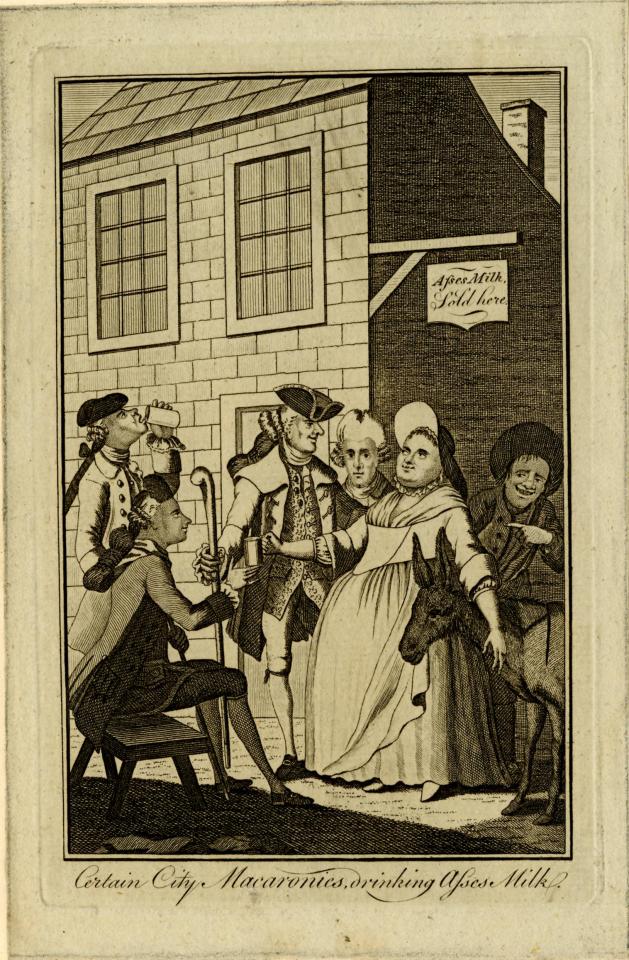
[Certain City Macaronies drinking Asses Milk, print, c.1772, via The British Museum.]
The association between effeminacy and asses milk features in the satirical dialogue The City Macaronies drinking Asses-milk, at the Lacteum, in St. George's-fields published in the November 1772 edition of the Oxford Magazine which was accompanied by the above illustration. The dialogue mocks macaroni for drinking asses-milk as a treatment for "nervous cases" and "hysterics" claiming that it's "delicate men" such as the macaroni "whose fine feelings are sensible of the slightest pressure, that are acquainted with hysterics". The son of the milk woman wonders aloud whether the macaroni are men or women. His mother tells him "they're neither, they are a kind of half and half breed."
Androgyny
With his slim figure and a bit of a baby-face Hervey was considered to be naturally androgynous. When Lady Deloraine said to him and Miss Fitzwilliams that "in her opinion a woman could never look too much like a woman, nor a man too much like a man" Hervey admitted that "considering the two people she said this to, it was certainly well said; and I can forgive her having bragged of it to every creature she has seen since" (Hervey to Stephen Fox, 18 September 1731)
Satirical descriptions of Hervey liken him to a cherub or a fairy describing him as pretty, little, soft, dainty, delicate.
In A Proper Reply to a Late Scurrilous Libel (1731) Pulteney satirises Hervey as "pretty Mr. Fainlove" who he describes as a "delicate Hermophrodite", a "pretty, little, Master-Miss", a "pretty, little Scribbler", and comments that he shouldn't "sully those pretty Fingers with Ink" that "a Fan would become them much better than a Pen."
The Lord H-r--y's First Speech in the House of Lords (1733-4) describes him as "the softest, prettiest thing". In An Epistle from Mr. Pope, to Dr. Arbuthnot (1735) Pope describes him as having a "cherub's face". Tell-tale Cupids (1735) satirises him as the "pretty baby fac'd Lord Dapper".*
In A Fairy Tale (1743) by Horace Walpole depicts Hervey as a literal fairy describing him as a "Dainty little Figure", "most delicately Fair and light" who "would have been vastly Pretty if it’s cherry-lips had ‘nclos’d any Teeth".
*quoted in Lord Hervey: Eighteenth-Century Courtier by Robert Halsband
Clothes & Makeup
Pope didn't describe Sporus as a "bug with gilded wings" and a "Fop at the toilet" because of Hervey's natural androgyny, clothing & makeup absolutely played a role in the public perception of him.
The Duchess of Marlborough described Hervey as a having "a painted face, and not a tooth in his head". Pope described him as "painted Child of Dirt that stinks and stings". And the The Court Garland refers to him as "Thou powder-puff, thou painted toy". (see The Opinions of Sarah Duchess-Dowager of Marlborough p42, An Epistle from Mr. Pope, to Dr. Arbuthnot & Lord Hervey: Eighteenth-Century Courtier by Robert Halsband p138)
The fashionable look of the period required pale clear skin, flushed red cheeks and dark eyebrows. While washes and creams were used to achieve clear pale skin, white cosmetic paint could also be used to lighten and smooth the skin. Rouge was used to give colour to the cheeks. Burnt cloves could be used to darken the eyebrows. While some of these cosmetics contained lead or mercury not all of them did.
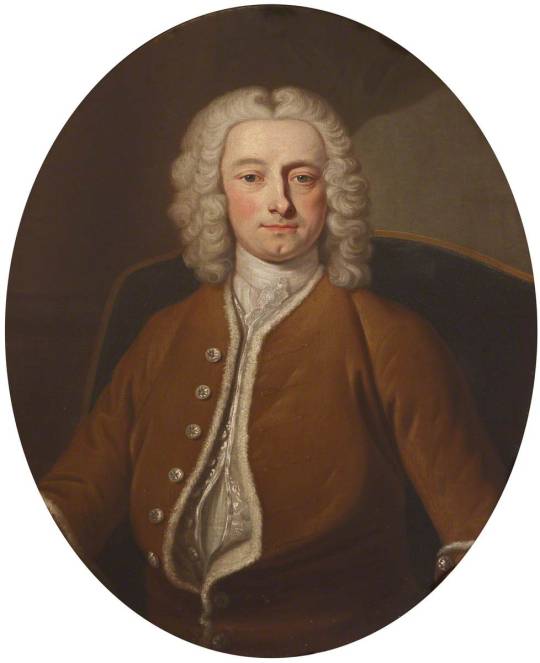
[Lord John Hervey, oil on canvas, c.1741–1742, by Jean-Baptiste van Loo, via Art UK.]
It's hard to know how reliable the accounts of Hervey's makeup use are however his portraits do depict him with this fashionable look (in particular the rosy cheeks of the Jean-Baptiste van Loo portraits and the Enoch Seeman portrait). While modern depictions of 18th century fops will sometimes exaggerate makeup depicting men with pure white faces and almost perfectly round red circles on their cheeks, Hervey's portraits are more accurate to the look these cosmetics were trying to achieve.
The use of cosmetics are highlighted in satirical depictions of effeminate men throughout the 18th century century. As early as 1691 Mundus Foppensis: or, the Fop Display’d was mocking men for the "wanton use" of "Spanish Red, and white Ceruse". In 1773 The Old Beau in an Extasy depicts a "Fop at Sixty two" who uses "Chinese Paint for Artificial Bloom". In 1812 Regency A la Mode depicts the Prince Regent applying rouge to his cheeks while he gets laced into stays. The Court Garland's satire of Hervey is just another example of a satirical depiction of a fop in makeup:
Thou powder-puff, thou painted toy, Thou talking trifle, H----y; Thou doubtful he, she, je ne sçai quoy, By G-d, the K--g shall starve ye.
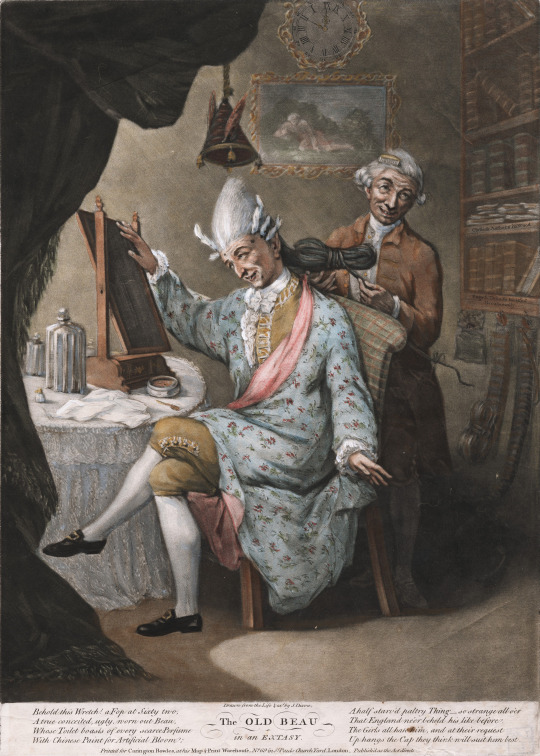
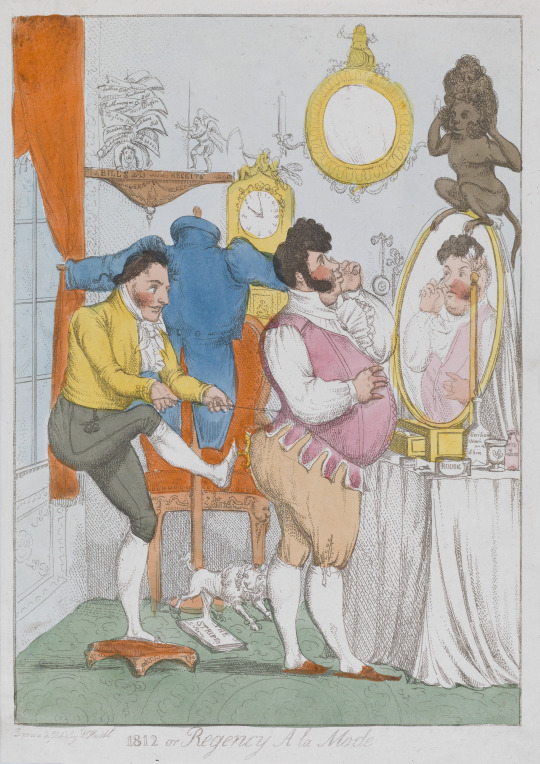
[Left: The Old Beau in an Extasy, print, c.1773, by John Dixon, via Lewis Walpole Library.
Right: 1812, or, Regency A la Mode, print, c.1812, by William Heath, via Lewis Walpole Library]
As for clothing I have to admit I'm better at late-18th century menswear. That being said material and colour seem to have played a role in what was considered effeminate.
A letter to the Read's Weekly Journal or British Gazetteer published on the 8th of May 1731 complains; "Rich and coloured Silks are in themselves effeminate, and unbecoming a Man; as are in short, all Things that discover Dress to have been his Study- 'Tis in vain for a Fop of Quality, to think his Title will protect him." In particular the article criticises poke sleeves and green waistcoats. While poke sleeves are absent from Hervey's portraits the Seeman portrait depicts him wearing a green waistcoat.
Green waistcoats are also mentioned in a story published in the Universal Spectator and Weekly Journal on the 18th of October 1729 describing and effeminate man's clothing as follows:
He had a flower’d pink-colour Silk Coat, with a Green-Sattin Waistcoat lac’d with Silver. Velvet Breeches, Clock’d Stockings the Colour of his Coat, Red-heel’d Pumps, a Blue Ribbon at the Collar of his Shirt, and his Sword-Hilt he embrac’d under the Elbow of his Left Arm,
This green waistcoat is laced with silver. In the Jean-Baptiste van Loo portraits you can see a embroidered silver waistcoat peeking out from beneath Hervey's coat.

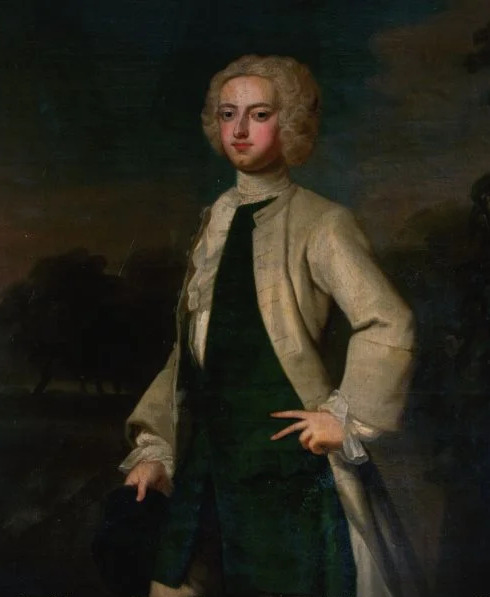
[Left: Lord John Hervey, oil on canvas, c.1737, by John Fayram, via Art UK.
Right: Lord John Hervey, oil on canvas, by Enoch Seeman, via The Collected Verse of John, Lord Hervey]
While the quality of the photo leaves much to be desired I wonder if the coat from the Seeman portrait is supposed to be silver. The coat he wears in the The Hervey Conversation Piece could also be silver but it might simply be grey. Sarah Osborn thought that silver coats looked effeminate. She wrote to Robert Byng on the 2nd of June 1722:
I believe the gentlemen will wear petticoats very soon, for many of their coats were like our mantuas. Lord Essex had a silver tissue coat, and pink color lutestring waistcoat, and several had pink color and pale blue paduasoy coats, which looked prodigiously effeminate.
Hervey wears a "prodigiously effeminate" pale blue, possibly paduasoy, coat (possibly a long sleeved waistcoat?) in the Fayram portrait.
The low buttoned waistcoat is somewhat interesting and consistent throughout his portraits, buttoned particularly low in the Fayram portrait. The effeminate Captain Whiffle from The Adventures of Roderick Random (1748) is described wearing his waistcoat "unbuttoned at the upper part to display a brooch set with garnets" but Hervey is broochless and looking at other portraits from this period the low buttoning doesn't seem to be unusual.
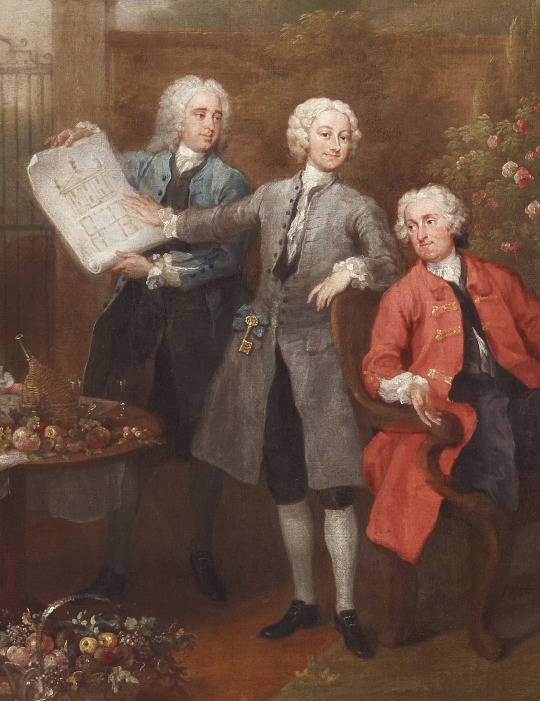
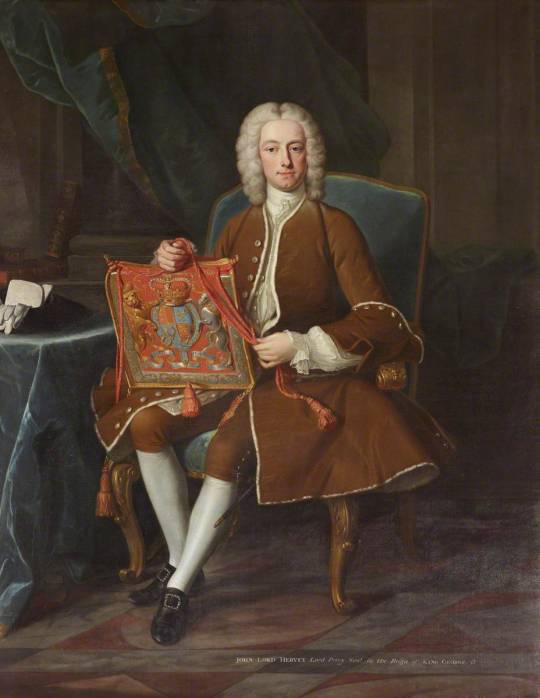
[Left: Detail of The Hervey Conversation Piece, oil on canvas, c.1738-40, by William Hogarth, via Fairfax House.
Right: Lord John Hervey, oil on canvas, c.1741, by Jean-Baptiste van Loo, via Art UK.]
Fur-lined suits like that worn by Hervey in the Jean-Baptiste van Loo portraits were imported from France or Italy and could be very costly. Mary Delany describes Lord Baltimore wearing "light brown and silver, his coat lined quite throughout with ermine" at a ball where "finery was so common it was hardly distinguished". (Mary Delany to Ann Granville, 22 Jan, 1739/40)
Fur-lined suits were somewhat of novelty in England and would become a feature in Grand Tour portraits. Peter McNeil explains in Pretty Gentleman (p123):
The novelty and glamour of new fashion goods generated excited responses to Lyons silk waistcoats, Italian velvets and fur-lined suits. There was a well-established tradition of wealthy men acquiring clothing on the continent and then having themselves painted in them, either in Italy or back in England.
(see Benjamin Lethieullier 1752, Lord Archibald Hamilton 1755-56 & John Scott 1774 all by Pompeo Batoni an artist well know for his Grand Tour portraits)
Hervey's buckles in the Jean-Baptiste van Loo portraits look to be set with paste (glass) or gems (buckles could even be set with diamonds). While it's impossible to tell what Hervey's buckles are set with these buckles could get very expensive. Later in the century macaroni were mocked for their expensive taste in similar buckles. (see McNeil p90)
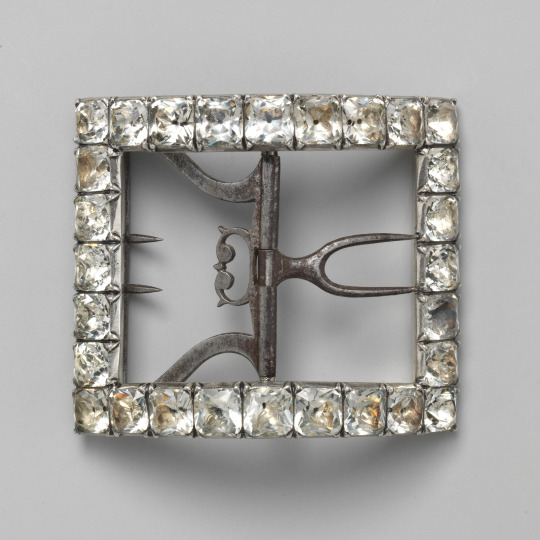
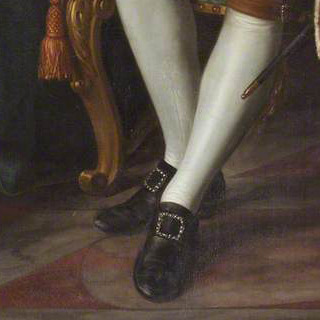
[Left: Shoe buckle, metal & paste, 18th century, British via The MET (83.1.103).
Right: Detail of Lord John Hervey, oil on canvas, c.1741, by Jean-Baptiste van Loo, via Art UK.]
While Hervey was certainly a fashionably dressed man he doesn't take it to the extent you might imagine of the archetypal fop. Satire exaggerates. Hervey's enemies chose their words deliberately to humiliate him. The amphibious thing of Pope's poetry was in reality a chronically ill queer man with a taste for fashion.
#I wrote this post while sick with covid so if anything doesn't make sense I blame the covid#lord hervey#queer history#fashion history
62 notes
·
View notes